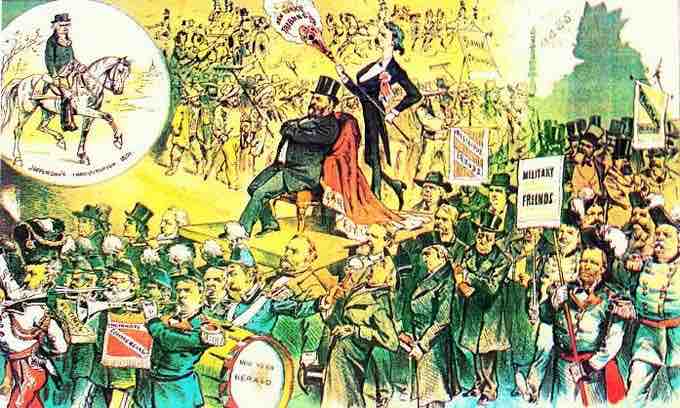Realignment of the Party System in the 1850s: The Republicans
Following the collapse of the Whigs during the election of 1852, a major realignment of the American political party system occurred with former Whigs splintering into various political factions. Anti-immigration and temperance movements formed the platform of the emerging American ("Know-Nothing") Party, while those interested in the economic development of finance and business in the West and North were attracted to the Republican Party. By 1858, the Republicans enjoyed majorities in every Northern state and therefore controlled the electoral votes in 1860 presidential election.
The driving ideological forces of the Republican Party were commercial expansion, modernization, and agricultural development in the West. Republicans were opposed to the perceived "anti-modernity" of the Southern slave culture and rallied behind the slogan of “Free Soil, Free Labor, Free Men,” which they argued was representative of classical American republicanism. Republicans sponsored bills, such as the homestead program, that would give western lands to individual (non-slave owning) farmers, and supported internal improvements designed to facilitate commercial travel to the frontier and develop infrastructure. Republicans argued that the North and the West were models of economic development, autonomy, and production in contrast to the South's limited industry and slave-labor system. Republicans portrayed themselves as the party of economic opportunity and advancement, offering individuals the chance for work, land, and success.
To that end, Republicans supported various railroad- and steamboat-building projects, approved the construction of new canals and roads, wrote legislation for higher tariffs as entrepreneurial incentives for financiers and industrialists, and passed homestead acts that enabled thousands of families to move west to establish productive farms and form larger communities. The “Free Soil, Free Labor, Free Man” ideology came to represent a Northern and western economy that was prosperous, commercial, and modern, and that resonated with the classical republican virtues of equality, liberty, self-government, and labor. This ideology cast the Republicans as the true heirs of the Jeffersonians.
However, it is important to note that mainstream Republicans were not inherently antislavery or abolitionist. Instead, they opposed the extension of slavery into western territories and new states, believing that the institution of slavery should be restricted to its traditional Southern boundaries. Opponents of the expansion of slavery included those who resented Southern political power, were committed to free labor as the future of American industry, or were morally opposed to slavery itself (for example, abolitionists from the more radical wings of the Republican Party).

Cartoon of the James Garfield inauguration
An 1881 cartoon attacks the imperial splendor of Garfield's inauguration in contrast to Jefferson's republican simplicity (depicted in the upper-left corner).